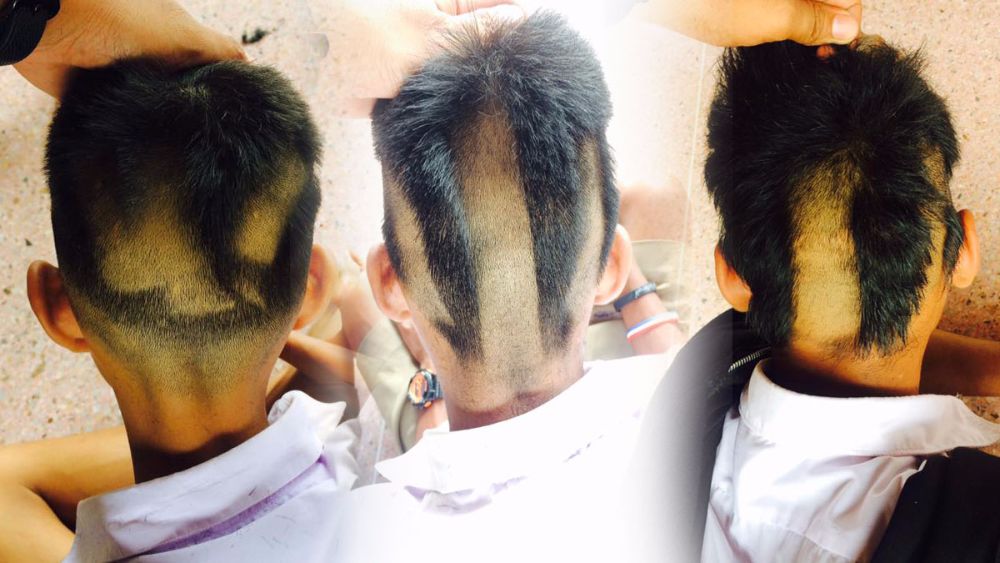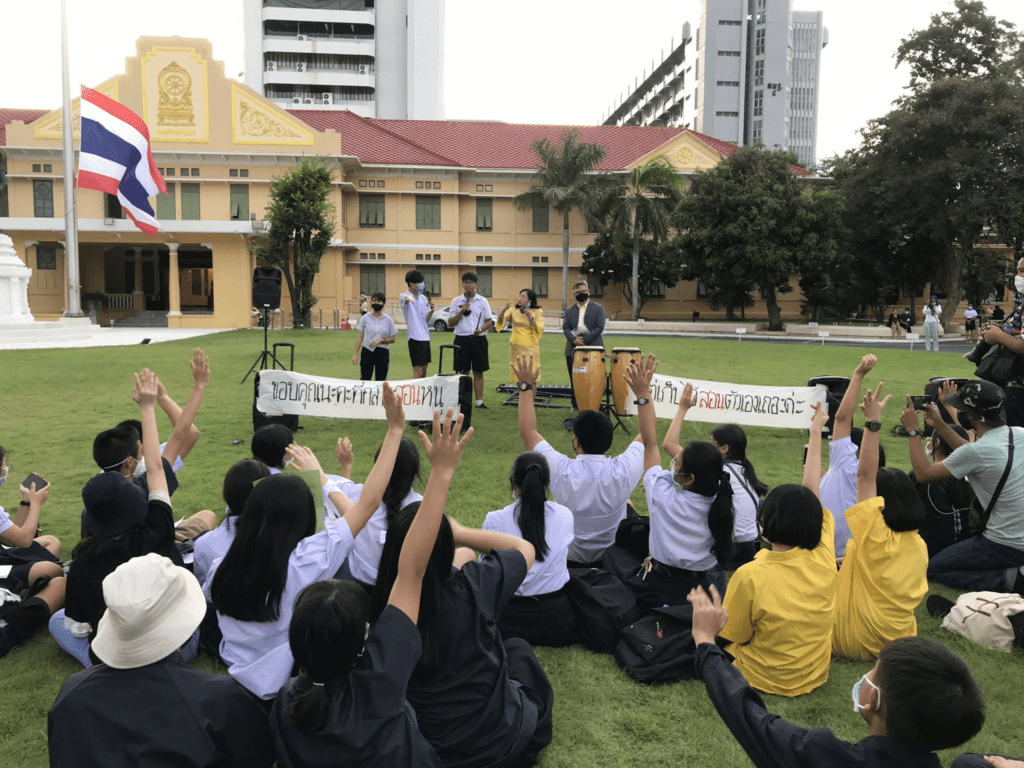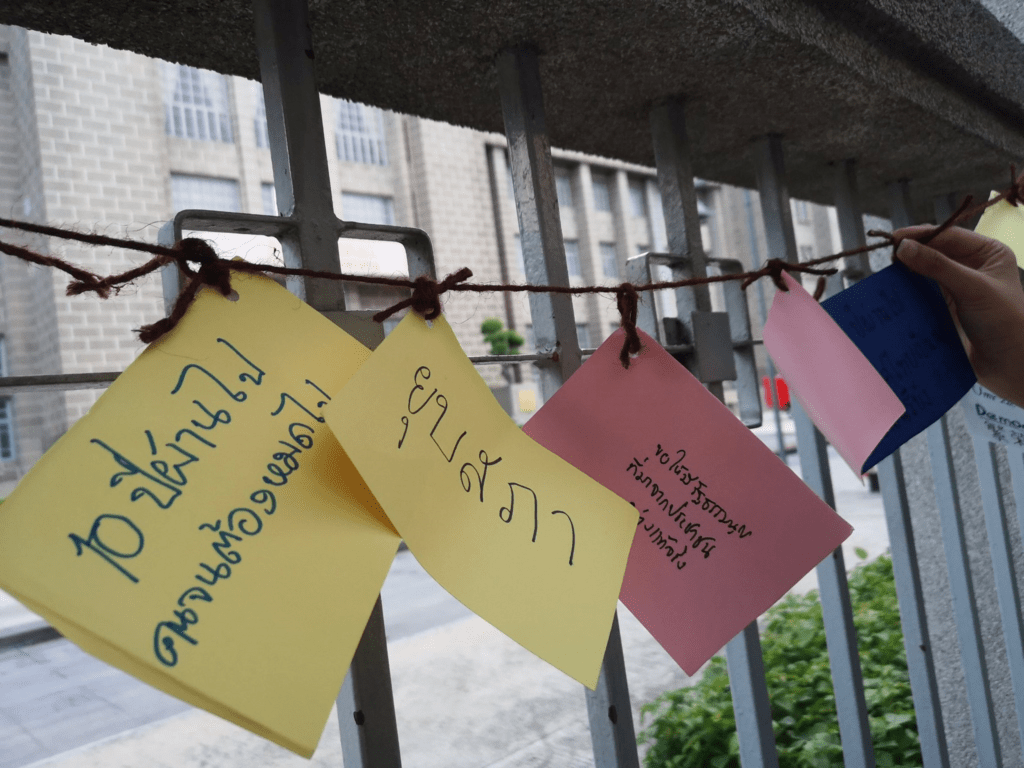THAILAND. Bangkok. Most of the time when students speak out and advocate for their rights, adults tell them to go home and focus on their studies so they can have a better future. However, many would argue how that´s even possible in such a problematic and underdeveloped education system.
In the past week, many student rights groups organized protest activities. Some of these include filing a lawsuit against education authorities for the abolition of outdated rules in schools, writing letters to their future selves, and holding demonstrations.
Controversial haircut policies
As Bangkok Post reported, Thai students have had haircut regulations since 1972. Despite the new regulations stating that students can have long hair, which started in 1975, most schools follow the old 1972 haircut rules. Male students need to maintain a buzzcut, while female students must wear their hair in a short bob.
In early May, the current education minister issued new regulations similar to the 1975 rules. However, the new ones didn´t require every school to follow but instead gave each school director the authority to determine what was appropriate.
It´s been reported that there are schools still making students wear their hair according to the old 1972 rules and teachers punishing them severely, which includes giving students ugly haircuts, when these rules are not followed.

Students file a lawsuit against outdated regulations
On 30 July, high school student activists from the Education for Liberation of Siam (ELS) group filed a lawsuit with the administrative court against the Ministry of Education (MOE) and its minister for the abolition of the current haircut policies.
According to the Thai Lawyers for Human Rights, the group accuses the MOE and its minister of five things.
The lawsuit states that relationships between students and the MOE should be limited to education-related things. As the law defines students as being under control of the MOE, the lawsuit says they should not be using that authority to control a student´s personal issues, such as their haircuts.
The lawsuit states that both the 1972 and 2020 regulations violate the constitution as they devalue a student´s human dignity. Also, the lawsuit outlines discrimination against minorities, especially LGBTQ and intersexual students, as students must follow the rules written for their biological genders.
The ELS believes haircut policies allow authorities to abuse their power since they cannot use and have not used those policies to achieve the goals stated in the laws. They also described severe punishments that many students face when they are not in compliance with the policies.
Lastly, the lawsuit explains how these policies violate the goals of education as stated in the National Education Act. The act specifies that education must be used to develop a Thai citizen into a “perfect human,” and also be used to make a citizen become knowledgeable of the political system, their rights, duties, freedoms, laws, equality, and human dignity.
Seventy-three people signed their names in the lawsuit.
A demonstration in front of the MOE
After the Bad Student Group submitted a petition to the MOE regarding haircut regulations, which saw no progress, members of the group organized a demonstration on 31 July. The theme of the protest was, “Thai students cannot bear it anymore,” according to Komchadluek.
Their demands were that teachers must not treat students poorly. Rules must not violate students’ basic human rights, and students must also be able to express their opinions. They projected those demands through singing a sarcastic parody song after giving speeches and handing out commonly used items that violate their rights.
Dr. Ketthip Suphavanich, the assistant to the MOE permanent secretary, negotiated with the students before inviting them to demonstrate inside the MOE area. Suphavanich said she would forward students’ concerns to the Permanent Secretary, Prasert Boonruang.
Issara Sereewatthanawut, a member of the Democrat Party and the vice-chair of a parliament committee, said on 1 Aug. that he will propose to his committee this week that they listen to the concerns of the students, according to ThaiRath.
The ELS and the New Life Network also organized a similar event on the same day about haircut policies and undeveloped curriculums.

Students share their dreams and hopes for the next 10 years
The Student Union of Thailand (SUT) and the Popular Student Network for Democracy (PSND) led the public in writing letters about what they hope to see in 10 years, as The Standard reported. The event was meant to let everyone express anything they wanted to tell themselves in the future and also people in the next generations.
All letters will be kept in the Museum of Commoners before disclosing them in 10 years time.
Some of the letters included sentiments like, “I lost many opportunities in the past years, some of them are long-term, who is responsible?” There was also optimistic commentary such as, “In the next 10 years, I hope Thailand will be great again,” and, “Do you know that on this day ten years ago, we had to fight a dictatorship. I hope that our fight is over if you’re reading this.”
All these events came after the protest by Free Youth on Saturday 18 July. The protest leaders said if their demands are not met in two weeks, they would take the protest to another level.
They launched a group called Free People and said they will announce the details of the next protest in the coming dates.


